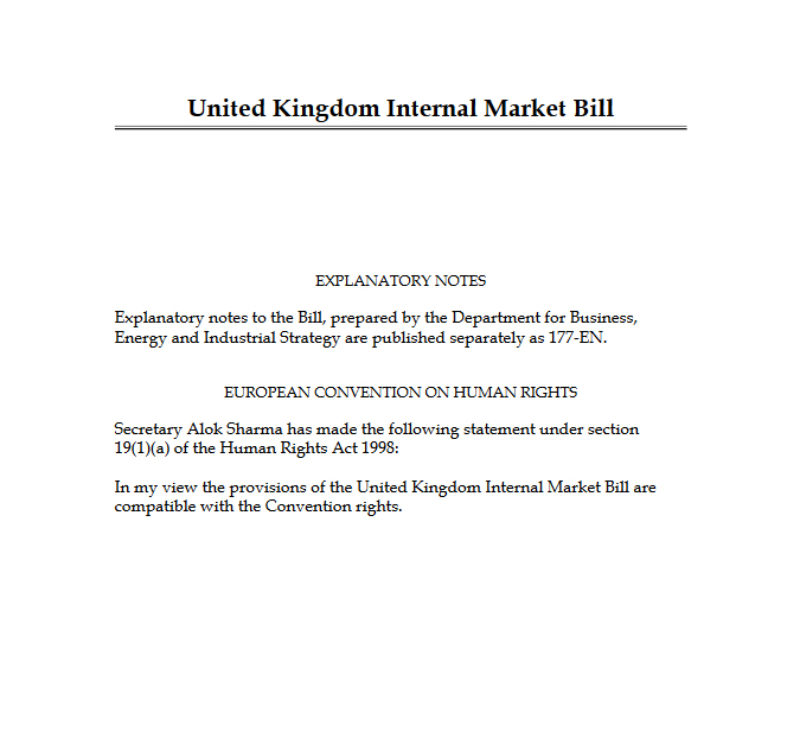
While the Prime Minister promised an ‘oven ready deal’ at the General Election for our future trade, it would appear that he forgot to switch the oven on and has now decided to remove the stuffing from the meat of the negotiations through serving up the Internal Market Bill.
This Bill sets out the UK Government’s plans for trade after the end of the transition period later this year as EU powers are repatriated to the UK or devolved administrations. Maintaining an integrated market across the four nations of the UK is the essence of what is intended through this legislation, however it is evidence that it falls short on current commitments, and the law.
There are a number of principles covered in this legislation. Firstly, there needs to be mutual recognition of goods and services, and no discrimination in the UK market, for example, through the labelling of products or fair and equal access to the UK market. The Government have decided that they will level down to the lower standards, of across England, Scotland, Wales and Northern Ireland, so if for example, Scotland had a ban on hormone treated beef, but England did not, then Scotland would have to sell this product. This means that the UK Government can cut standards against the will of devolved nations, completely undermining devolution.
Second, professional qualifications should be recognised across the UK, although there are some exceptions cited in the Bill.
Third, the Office of the Internal Market will be created and fall under the Competitions and Markets Authority to act as an advisory body reporting to all four legislatures.
Fourth, and this is where there is serious concern, the Northern Ireland Protocol will be changed. The Bill would prevent any Government from introducing new controls on goods, moving directly from Northern Ireland to Great Britain and would give UK Ministers powers to set aside the provisions of the Withdrawal Agreement (an international treaty lodged with the United Nations) in respect of state aid and the requirement for export licences for Northern Irish goods. This is jeopardising the Good Friday Agreement and undermining the devolution settlement. This single act has seen widespread condemnation from the EU, who have described EU-UK relations as “at their worst since 2016” and could even damage the chance of a UK-US trade deal. Even prominent members of the Conservative Party have condemned the Government’s actions which would “break treaty obligations”.
Fifth, The Bill would enable the Government to use public money to fund economic development, infrastructure, sports and cultural activities, and international and intra-UK exchanges through new financial assistance powers. This means that the Westminster Parliament can interfere in devolved decisions when funding, for instance, services like the NHS.
Six, it would change devolved legislation on the regulation on subsidies regimes.
Seventh, new powers would result in only Westminster having the power to bring forward changes in the future, not devolved countries, thus undermining current devolution arrangements.
Through undermining international law, the EU Withdrawal Agreement and Northern Ireland Protocol, and therefore the Good Friday Agreement, the Prime Minister is in breach of the law, as well as threatening peace in Northern Ireland.
With the UK having regrettably left the EU at the end of January this year, the UK needed to secure a strong agreement with the EU, which it is failing to do, and come up with a comprehensive resolve for addressing the issues facing Northern Ireland in its relationships with the Republic and the rest of the UK, and ensure that there was no inequality of treatment between any of the devolved countries. This legislation has failed to pass these tests.
So Labour has responded by laying what is called a ‘reasoned amendment’ to the Bill, which recognises that now that we have left the EU, that we need an Internal Market Bill, but not this one. We therefore state that Labour “declines to give a Second Reading to the Internal Market Bill because this Bill undermines the Withdrawal Agreement already agreed by Parliament, re-opens discussions about the Northern Ireland Protocol that has already been settled, breaches international law, undermined the devolution settlements and would tarnish the UK’s global reputation as a law-abiding nation.”
Apart from the illegal actions of the Prime Minister, the irony is that he hailed the Withdrawal Agreement as a “fantastic deal for the country”, yet having negotiated and signed the agreement himself is now saying that it contains serious problems that could break up our country. This is a monumental admission of failure and shows that you can never trust a word that the Prime Minister says. Now subject to a rebellion from his own backbenchers, the Prime Minister needs to withdraw this Bill, and start realising that Brexit is not a political game, but will impact the livelihoods of millions of people and businesses across the country.

